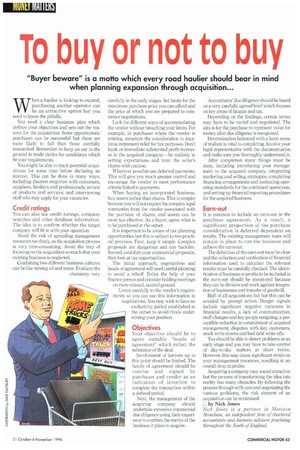1 71 buy or not to buy W hen a haulier is
Page 45

If you've noticed an error in this article please click here to report it so we can fix it.
looking to expand, purchasing another operator can be an attractive option but you need to know the pitfalls.
You need a clear business plan which defines your objectives and sets out the reasons for the acquisition. Some opportunistic purchases can be successful but these are more likely to fail than those carefully researched. Remember to keep an ear to the ground in trade circles for candidates which fit your requirements.
You might be able to track potential acquisitions for some time before declaring an interest. This can be done in many ways, including discreet enquiries with customers, suppliers, bankers and professionals; review of products and services; and interviewing staff who may apply for your vacancies.
Credit ratings
You can also use credit ratings, company searches and other database information. The idea is to confirm whether the target company will fit in with your operation.
Avoid the risk of spreading management resources too thinly, as the acquisition process is very time-consuming. Avoid the trap of focusing on the acquisition so much that your existing business is neglected.
Combining two different business cultures can be like mixing oil and water. Evaluate the chemistry very carefully in the early stages. Set limits for the maximum purchase price you can afford and the price at which you are prepared to commence negotiations.
Look for different ways of accommodating the vendor without breaching your limits. For example, in purchases where the vendor is retiring, structure the consideration to maximise retirement relief for tax purposes. Don't bank on immediate substantial profit increases in the acquired company—be realistic in setting expectations and treat the seller's claims with caution.
Wherever possible use deferred payments. This will give you much greater control and encourage the vendor to meet performance criteria linked to payments.
When buying an incorporated business, buy assets rather than shares. This is simpler because you will not require the complex legal warranties from the vendor associated with the purchase of shares, and assets can be more tax effective. As a buyer, agree what is to be purchased at the outset.
It is important to be aware of tax planning opportunities but this is subject to two practical provisos. First, keep it simple. Complex proposals are dangerous and can backfire. Second. establish your commercial proposals, then look at tax opportunities.
The initial approach, negotiations and heads of agreement will need careful planning to avoid a rebuff. Enlist the help of your finance person and consider holding meetings on more relaxed, neutral ground.
Listen carefully to the vendor's requirements so you can use this information in negotiations. You may wish to have an exclusivity period established at the outset to avoid rivals undermining your position.
Objectives
Your objective should be to agree suitable "heads of agreement" which reflect the substance of the deal.
Involvement of lawyers up to this point should be limited. The heads of agreement should be concise and signed by purchaser and vendor as an indication of intention to complete the transaction within a defined period.
Next, the management of the acquiring company should undertake extensive commercial due diligence using their experience to confirm the merits of the business it plans to acquire. Accountants' due diligence should be based on a very carefully agreed brief which focuses on key areas of finance and tax, Depending on the findings, certain terms may have to be varied and negotiated. The aim is for the purchase to represent value for money after due diligence is recognised.
Determination balanced with a keen sense of realism is vital to completing. Involve your legal representative with the documentation and make sure you thoroughly understand it.
After completion many things must be done, including introducing your management to the acquired company, integrating marketing and selling strategies, completing financing arrangements and instituting operating standards for the combined operations, and setting up financial reporting procedures for the acquired business
Earn-out
It is common to include an earn-out in the purchase agreement. As a result, a significant proportion of the purchase consideration is deferred dependent on results. The existing management team will remain in place to run the business and achieve the earn-out.
The definition of the earn-out must be clear and the collection and verification of financial information used to calculate the relevant results must be carefully checked. The identification of business or profits to be included in the earn-out should be monitored because they can be divisive and work against integration of businesses and transfer of goodwill.
Half of all acquisitions fail but this can be avoided by prompt action. Danger signals include significant negative variances in financial results, a lack of communication, staff changes and key people resigning, a perceptible reduction in commitment of acquired management, disputes with key customers, stock write-downs and bad debt write-offs.
You should be able to detect problems at an early stage and you may have to take control of day-to-day matters at short notice. However, this may cause significant strain on your management resources, resulting in an overall drop in profits.
Acquiring a company may sound attractive but the process of transforming the idea into reality has many obstacles. By following the process through with care and negotiating the various problems, the risk element of an acquisition can be minimised.
L: by Nick Jones Nick Jones is a partner in Morison Stoneham, an independent firm of chartered accountants and business advisers practising throughout the South of England.




































































































































